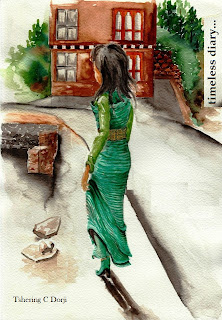BABESA BABESA! TAXI TAXI!
About two years ago, I had gone to taxi stand near Thimphu bus station to drop a cousin who wanted to go Paro during Tshechu holidays. I was taken with surprise when I reached there. There were many passengers and many taxis but interestingly, the taxi drivers, who had formed a syndicate to make profits during Tshechus holidays were refusing to ferry individual passenger for anything less than Nu. 400 each per passenger. Usual rate was Nu.100. Their charges were beyond the affordability of common people. No one wanted to budge beyond that rate and the passengers, mostly students going home to meet their parents were caught in between the unreasonable demand of the taxi drivers and their wallet contents. I realized then that Bhutanese have now bred a leech called taxi drivers. We have also given birth to cockroaches like public utility vandals who not only broke street lights but also made walking around our own neighbourhood unsafe.
It is refreshing to know however, that new centenary taxi has been started with better facilities, convenience and which above all is reasonably priced. The society has a responsibility to make it work by availing n its services so that the so called “yellow hooded” taxi services could reinvent themselves. So far, they have been successful in fighting away good ideas of forming better association to provide improved services. Their main focus so far has been the taxi fare only. When the fuel price goes up, they want to charge more. On few occasions, the fuel price went down too but I never heard that the taxi fares were reduced.
In next five years or so, it is forecasted that the fuel price would however, reach $250 per barrel which means that the petrol price per liter would be about Nu. 150 in Bhutan. Unless energy efficient cars come within these period, it would be difficult to maintain car. Travelling by taxis, especially for common folk would be beyond reach. Most would be required to travel in bus and other public transport facilities.
Taxi meters have worked across the world. However, Bhutanese Taxi drivers’ argument is that it would not work in Bhutan because it is mountainous country. Bhutan is not the only mountainous country in the world. There are plenty of mountainous country and the meter seems to have worked there perfectly. In fact I have noticed that travelling in meter is cheaper than travelling on arbitrary price. For locals who know the road well, it is lot cheaper to travel by meters than travel by arbitrarily agreed price. The reason why the meter system in Bhutan failed must be because the taxi drivers injected fear that the passengers would be charged higher. In the meantime, taxi drivers leeched around RSTA that the passengers were not willing to travel on meters. The authorities concerned never bothered to implement it. They never bothered to educate the public well of its benefits. Like smoke and plastic ban, it became another mockery of the law.
Taxi drivers would do anything to protect his existing income if it is high. They have proven their capability in discouraging people to use meters. Seat belt concept worked well. People now unconsciously strap the seatbelt while they get into the car. It is just that people will have to make habit. There is no doubt that taxi meter concept would work well too. The authority just need to impose for about a year strictly and it would work.
It may be important for all the service provider to understand that, public do not just buy service alone today but they also buy conveniences. Given the poor state of our “yellow hooded” taxis, we might as well vote for change - change of both the car and service attitude. Therefore, the arrival of centenary taxi is a welcome news. I hope it brings in a new concept of service for the people.
By the ways, many readers may wonder what would happen to the families of the taxi drivers. There is no reason to worry. Drivers never become unemployed. They just need to change their attitudes and taxi. Taxi can be changed but their focus on money alone needs to change more. The market will balance them well.
